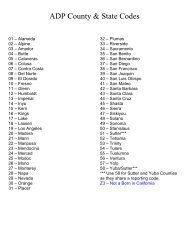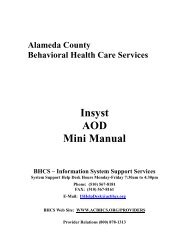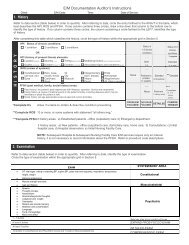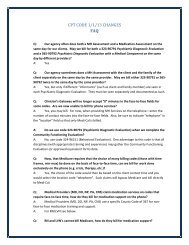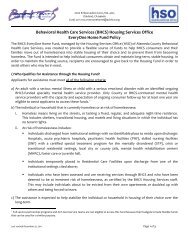Juvenile Competency Protocol - Alameda County Behavioral Health
Juvenile Competency Protocol - Alameda County Behavioral Health
Juvenile Competency Protocol - Alameda County Behavioral Health
Create successful ePaper yourself
Turn your PDF publications into a flip-book with our unique Google optimized e-Paper software.
<strong>Competency</strong> Restoration Plan<br />
Set date for Receipt of Restoration of <strong>Competency</strong> Plan within 7-10 calendar days<br />
of the court’s finding of incompetency. However, if a Restoration Plan is recommended<br />
in current evaluation and the parties agree, the court may adopt the recommended plan<br />
for Restoration. See Section One, V above.<br />
Placement of Minor<br />
If a program of competency restoration is ordered, the Court must order the minor<br />
placed in the least restrictive environment, taking into consideration these factors:<br />
1. Where will the minor have the best chance of obtaining competence<br />
2. What are the needs of the minor<br />
3. How serious is the underlying offense(s)<br />
4. Is there a need to protect the community<br />
Restoration of <strong>Competency</strong> is the Main Goal<br />
Standard probation and mental health services shall not interfere with the primary<br />
short term goal of attempting to obtain/restore a minor’s competence. For instance,<br />
although an Individualized Education Plan is important in normal situations, it is not the<br />
paramount goal during the period that Probation and Mental <strong>Health</strong> is attempting to assist<br />
the minor to obtain/restore competence. Standard services which are not essential to the<br />
minor’s competence shall be postponed until after the competency process has been<br />
completed. If however, some services will help the minor obtain/restore competency<br />
(including educational services), those services will be provided.<br />
Of course, the <strong>Juvenile</strong> Court has an obligation to ensure that minors in the<br />
court’s care do not deteriorate mentally, physically or emotionally. Toward that end,<br />
services that maintain the minor’s health must be provided.<br />
State Examination of Developmentally Disabled Minors<br />
If the court suspects the minor is developmentally disabled, there is statutory<br />
process that leads to a State mental and physical examination of the minor and ensures<br />
the minor receives proper services.<br />
“Developmental disability” is defined in W&I Code §415(a). There are two tests:<br />
The first test is that the person must have one of the following: (1) Mentally retardation,<br />
which under DSM IV criteria means an IQ of approximately 70 or below on an<br />
individually administered IQ test and concurrent deficits or impairments in present<br />
adaptive functioning in at least two areas, (2) autism, (3) a seizure disorder, (4) cerebral<br />
palsy, or (5)…[the person functions similar to, or needs that same treatment as, a<br />
mentally retarded person]. The second test is the person must have 3 of 7 impaired<br />
functions: (1) learning, (2) communication, (3) independent living, (4) self care, (5)<br />
mobility, (6) economic self sufficiency, and/or (7) memory.<br />
In order for a person to qualify for these services, the State Regional Center<br />
within the geographic location of the court must examine and accept the client. Because<br />
18 Superior Court, <strong>Alameda</strong> <strong>County</strong>, California<br />
<strong>Juvenile</strong> Court, <strong>Juvenile</strong> <strong>Competency</strong> <strong>Protocol</strong><br />
March 1, 2013



